AI Transforming Health Care: Bridging Academic and Clinical Practices
In the ever-evolving landscape of health care, artificial intelligence (AI) is emerging as a transformative force, bridging the gap between academic institutions and clinical practice. As reported by Oncology Nurse Advisor, AI is revolutionizing diagnostics, treatment, and patient care, with significant advancements particularly noted in fields like radiology and oncology.
AI’s potential to enhance diagnostic accuracy has been a focal point, as its integration with physician diagnoses is believed to improve confidence and system performance. The original article highlights how AI is being utilized to develop automated cancer detection software, which is crucial for early diagnosis and personalized treatment regimens.
AI in Academic vs Clinical Settings
While academic institutions are at the forefront of AI research, focusing on developing and validating digital therapeutic tools, clinical practices are leveraging AI primarily to improve workflow efficiency. Dr. Ravi B Parikh from the University of Pennsylvania emphasizes that AI tools approved by the FDA are often more accessible to larger academic health systems, leaving smaller clinics at a disadvantage due to cost and data limitations.
Despite these challenges, the potential for AI to reduce the administrative burden in clinical settings is promising. AI can streamline tasks such as billing and claims processing, which could significantly enhance patient satisfaction and management.
Remote Monitoring and Telemedicine
The COVID-19 pandemic has accelerated investment in remote monitoring technologies, with AI-powered wearables and virtual nursing assistants emerging as key tools for patient care. These innovations are particularly beneficial for underserved areas, where AI-driven diagnostic tools can aid health care professionals in making accurate diagnoses based on patient-reported symptoms.
However, device literacy remains a barrier, as noted by Dr. Parikh, who calls for solutions that enhance the ability to process patient visits and improve documentation without necessarily requiring FDA approval.
The Future of AI in Health Care
AI and machine learning hold the promise of more precise immune therapies, improved clinical decision-making, and ultimately, better patient outcomes. Dr. Parikh predicts that within the next 5 to 10 years, AI will become as integrated into health care as electronic health records once were.
As AI continues to evolve, the focus must remain on making these technologies accessible to all health care providers, ensuring that the benefits of AI are felt across both large academic systems and community-based health facilities.
More Articles
Getting licensed or staying ahead in your career can be a journey—but it doesn’t have to be overwhelming. Grab your favorite coffee or tea, take a moment to relax, and browse through our articles. Whether you’re just starting out or renewing your expertise, we’ve got tips, insights, and advice to keep you moving forward. Here’s to your success—one sip and one step at a time!
Real Estate vs. Stocks: Breaking Down the Buzz
Ever Wondered Why Everyone’s Buzzing About Real Estate vs. Stocks? Let’s Break It Down!
Alright, let’s talk about something you’ve probably seen pop up countless times on your feed, especially if you’ve ever Googled “how to invest” on a random Tuesday afternoon. Stocks vs. Real Estate – which one’s the better way to build wealth? And once you dive into it, it’s easy to see why reaction videos and discussions about this topic are all over the internet.
So, imagine you’re sitting there with your coffee (or wine, no judgment), browsing through YouTube, and up pops this video by Shelby Church titled “5 Years in Stocks vs. Real Estate: Which Made Me More Money?” Sounds like a solid question, right? We’ve all had that gnawing question about where to put our money. Plus, who doesn’t dream of escaping the 9-5 grind with dividends and rent checks?
The Big Question: Real Estate or Stocks?
Let’s be honest, who hasn’t fantasized about being the next property mogul like they’re walking the set of Selling Sunset? Or maybe you’re more comfortable picturing yourself sipping cocktails while your index fund quietly does its thing in the background.
Our host, Stefan, jumps into Shelby’s comparison and adds his two cents. Right off the bat, he makes one thing clear: Real estate? Not passive. No sir. It’s like that one group project where you do 90% of the work while Greg never shows up. Sure, real estate can make you loads of money, but it’s going to involve a lot more elbow grease than, say, parking your cash in an index fund and binging Netflix for the next few years (or decades).
Stocks – The Quiet Performer
Shelby’s video lays out a pretty shocking stat: If you had invested $300,000 in the stock market in 1988, you’d be looking at a cool $14 million now. Say what?! That’s an almost 4,000% return. Mind blown.
Now before you start imagining Scrooge McDuck swimming in coins, Stefan breaks it down further: stocks, especially if you’re playing it smart with dividends and tax-advantaged accounts, offer those sweet returns and the simplicity many of us crave as we get older. Can we talk about “stress-free” for a second here?
Stocks are like setting up an easygoing autopilot – you invest what you can, and over time, that cash starts multiplying. Of course, nothing’s ever totally risk-free, but stocks offer that peace of mind.
The Glamorous (but High-Maintenance) Life of Real Estate
Not to be outdone, real estate certainly has its positive moments. The allure of being able to leverage your investments is intriguing. Stefan throws out an example: if you put $100,000 down on a $400,000 property, you get to control the whole thing and any appreciation can skyrocket your return.
But, reality kicks in when you crunch numbers: property taxes, insurance, maintenance, commissions, and hello… tenants who may (or may not) be ideal. Real estate’s a commitment, like a long-term relationship. Except instead of remembering anniversaries, you’re fixing water heaters and repainting old railings.
Real Talk: What’s More Painless?
This video was packed with golden nuggets that made me reconsider getting too fancy with real estate. Stefan, about halfway through the video, drops one of those hard-to-hear truths:
“The older I get… I value peace of mind.”
I feel that. Who wouldn’t trade a little bit of additional return for less stress? These days, more than ever, it seems like we’re all craving simplicity.
Stocks and Real Estate – A Balancing Act?
Now, Stefan doesn’t just bash real estate. Heck, he’s been in the game since 2008. He’s seen some major wins from it. But with high mortgage rates and low inventory, real estate is starting to look like more of a headache than a gold mine.
So… What’s the Verdict?
If there’s one thing this video drives home, it’s that there’s no one-size-fits-all answer. For me? As much as I love diving into Zillow, I’m leaning more towards stocks. They hit that sweet spot between returns and “no headaches after 10PM.”
But what about you? Let’s chat in the comments – I’d love to hear your thoughts!
Ever Wondered What a Second Donald Trump Presidency Could Mean for the Housing Market?
Ever Wondered What a Second Donald Trump Presidency Could Mean for the Housing Market? Strap In.
We’ve all been there, scrolling through your feed at 2 AM, being bombarded with reaction videos. But have you ever wondered what we’d get if you created a reaction to, well, the future? Buckle up because today, we’re diving deep into the possible fallout of a Trump presidency on the U.S. housing market by 2025. Yes, we know, predicting the future can feel a bit like reading tea leaves, but if there’s one thing more unpredictable than the weather, it’s political economic policy. Still here? Good. Let’s dive into this rollercoaster of speculation.
The Context: Trump, Interest Rates, and a Housing Market that Never Sleeps
Now, before you snooze off (please don’t), here’s a quick refresher on why this is relevant. We’ve all been watching in fascination (and a wee bit of panic) as housing prices have shot through the roof—pun intended. Throw a Trump presidency into the mix, and we’re on a whole new wild ride. According to the transcript I’m reacting to, mortgage rates, which are already dancing around 7%, are expected to soar even higher.
Wait, what? Didn’t Trump campaign on lowering interest rates?
Yep! So, why the sudden spike? Something called the “Trump Trade.” Picture this: As Trump’s chances of winning the election rise, so do long-term interest rates. And as much as Trump, the businessman, is all about cutting rates, his fiscal policies and that infamous tariff-loving streak might do the exact opposite. It’s kind of like saying you’re on a diet, but then eating a pizza. The paradox is real, folks.
My Take: “Pro-Business” Magic? Or a Bigger Bubble?
Part of me kinda likes the idea of optimism encouraging more home-buying. After all, who doesn’t want more people experiencing that sweet joy of home ownership (and the not-so-sweet mortgage payments that come with it)? And, yeah, Trump did inspire some confidence in the housing market years ago. Back when he took office in 2016, mortgage applications spiked like crazy—like everyone suddenly had FOMO and decided that immediately after the election was the golden moment to buy a house.
But—and it’s a big ol’ BUT—circumstances now are a bit like comparing apples to, well, exploding apples. Affordability? She doesn’t live here anymore. In 2016, the monthly cost to own a home was a breezy $1,200. Fast forward to our current nightmare, and it’s skyrocketed to $2,800. Considering most people now have to chuck away 40% of their income just to make mortgage payments? Yeah. Just casually marrying yourself to a mortgage sounds a bit like economic masochism right now.
Analysis: Déjà Vu or New Housing Bubble?
This transcript really got me thinking, though—especially about past housing market trends. Remember 2008? You know, the year that brought us the housing crash that soon led you to memorize budgets like your life depended on it. Well, we might be edging towards a repeat—at least according to the icy (pun intended) foreclosure data mentioned in the transcript. Apparently, early-stage delinquencies on mortgages are reaching levels we haven’t seen since that frosty collapse of ‘08.
Want to hear something even more terrifying? There’s this HUGE backlog of foreclosures that’s just waiting for its moment, like the villain creeping around in the third act of a horror movie.
Unlike the pandemic-induced moratorium (which plastered over the cracks), these foreclosed properties aren’t going to wait forever. And Trump, being significantly less hands-on when it comes to economic interventions, might lift the lid on that foreclosure jar. Imagine that—your neighbor defaults and suddenly there’s a “For Sale” sign on every block.
A more laissez-faire approach from a Trump presidency might result in all those distressed homes hitting the market, accelerating price drops. But here’s the thing: housing markets thrive on more buying, not just selling, unless it’s your goal to create the biggest game of Monopoly ever.
What About the FED: The Trump-Powell Smackdown (Sequel)
Now, let’s pivot to the ultimate showdown: Trump vs. Jerome Powell (again). If you didn’t catch the live-action drama during Trump’s first presidency, let me remind you that Trump was not Powell’s biggest fan. He basically blasted the guy on Twitter like Powell was some contestant on The Celebrity Apprentice who messed up the boardroom task.
Trump already pressured Powell back in 2018 and 2019 to cut rates. Will history repeat itself if the same two characters enter the ring in 2025?
I can already picture Trump tweeting at the FED from the Oval Office about “disastrous rate policies.” But will Powell cave again? Seeing as higher interest rates could continue squeezing not just buyers but investors as well, this tug-of-war could be a major game-changer. The longer interest rates stay up, the more painful it gets for anyone using debt as a crutch—more so considering we’re already feeling like the band-aid is getting ripped off too slowly.
So, Is it Time to Panic?
Ah, panic. That comforting blanket you throw on when the economy takes wild swings. But fret not! As the transcript emphasizes, the macro news—interest rates, the FED, Trump’s policies—certainly matters, but don’t overlook what’s happening locally. It’s often the neighborhood-level fundamentals that will make or break the decision to buy or invest in the real estate market. Maybe it’s time you start paying attention to “cap rates” and other key indicators that can guide your real estate Game of Thrones strategy.
What Do You Think? The Future, Politics, and Your Pocket
So, after this rollercoaster journey through what a Trump presidency could spell for home buyers, sellers, and renters alike, what do you think? Would you hold off on buying that dream house and risk waiting to see a burst bubble in 2025—or do you think Trump could rally some much-needed optimism that might stabilize prices even with the foreclosures coming?
I’m curious—where are YOU at in your housing journey? Drop your thoughts below! Let’s build this little community of fellow housing-market watchers and maybe, just maybe, we’ll get through 2025 together with a bit fewer gray hairs.
Oh, and before I forget—if you’re a real estate nerd (like me, c’mon, it’s cool), go check out ReVenture’s app. It’s like Zillow on steroids, giving you juicy details on everything from cap rates to market trends, and might just help you dodge some of those lurking 2025 pitfalls. 🌪️🏠
Unveiling Success Through Ryan Serhant’s Lens: Winning in Real Estate and Life
Ever Wondered Why Some People Just Keep Winning? Let’s Dive Into the Mind of Real Estate Guru Ryan Serhant
Alright, let me start with this: ever caught yourself wondering why some people just won’t stop winning? I know, it’s like ugh, can’t relate. But here’s something wild – I just stumbled upon a transcript of Ryan Serhant chatting on The School of Greatness podcast, and let me tell you, this guy didn’t just drop real estate gems, he unloaded freakin’ life hacks! For those of you who may not know, Ryan Serhant is that tall, smiley dude from Million Dollar Listing who somehow makes selling million-dollar penthouses in Manhattan look as easy as deciding what to order for lunch (though, let’s face it, even choosing between a sandwich and a salad can feel herculean sometimes). And while he’s been on TV, written books, and launched his own real estate empire, his journey proves that not everything has been rainbows and commissions. The guy has put in WORK.Wake Up Call: It’s Not About Being Important – It’s About Being Happy
So let’s kick off with this bombshell Ryan dropped during the podcast – he said there was this moment where he realized he’d spent the last 20 years trying to feel important, but what he really wanted was to feel happy. I mean, relatable, right? We’ve ALL been there, grinding away at that 9-to-5, posting on social media, thirsting for validation with every like and emoji reaction. Yet, at the end of it all, sometimes we’re left asking ourselves, “But wait… am I happy?” And Ryan, at the top of his game, had that exact lightbulb moment at 40. You can’t be important to everyone and still feel empty when it comes to yourself. I’m not saying quit your job and go “Eat, Pray, Love” on us, but sometimes, we all need that reminder to check in with ourselves. What’s the point of doing all this work – collecting accolades and paycheck after paycheck – if we aren’t enjoying the ride?The Fear of Being Embarrassed > The Fear of Failing
One of the hardest-hitting truths Ryan shared in the transcript was this: “People aren’t afraid of being failures, they’re afraid of being embarrassed.” Let that sink in for a second. Embarrassment – that stomach-dropping, face-flushing moment when something doesn’t go as planned and you KNOW people are watching. Yikes. It’s like, who doesn’t have that voice in the back of their mind saying, “But what if I look dumb?” Ryan went on to say how important it is to make mistakes. He spent a year and hundreds of thousands of dollars creating apps and virtual platforms that NO ONE used. Like, crickets. And though those projects flopped, they weren’t just mistakes; they were stepping stones. He learned, adapted, and ended up launching something that actually worked – his software, Simple, which streamlines tedious tasks for real estate agents. Heck, he’s now got a 97% usage rate. Try topping that. So next time you’re holding back because you’re worried what your colleague Karen or your judgmental cousin might think if you fail, just remember this: even Ryan Serhant spent boatloads of time and cash on ideas people ignored. If he can bounce back, so can you.100x Your Mindset – Like a Billionaire Does!
Okay, let’s be real for a sec. Anyone else here just hoping for 2x results on anything in their life? Lose weight twice as fast? Double my annual salary? Have two good hair days in a row? Meanwhile, Ryan’s hanging out with billionaires who’ve completely flipped the script. These movers and shakers aren’t thinking in small, gradual growth. These folks are striving for 100x, baby. Why take small swings when you can knock it out the park? Ryan is surrounded by people who are asking themselves big questions like, “How can I take this idea and scale it to 100x?” and “How do I turn every person I meet into a future collaborator?” I mean, I don’t know about you, but my brain Googles “how to scale anything to 100x” and starts buffering right away. But think about it – it’s powerful. Millionaires think about money, billionaires think about time. They streamline, they delegate, they make decisions fast. Ryan even pointed out how these people barely glance at menus in restaurants – they just tell the server, “Surprise me,” so they can focus on way more important matters. And honestly, that sounds like a life hack in itself – less time spent agonizing over choices, more time living life.What We Can Learn from Ryan: Embrace the Hustle—but with Purpose
Ryan has this undefinable, burning passion for sales – a profession that unlocked his potential. But when talking about success, he’s quick to elaborate that you have to figure out what YOU’RE actually passionate about. Is it the work or the results? He used to think he loved the grind of closing deals, but realized he was more about the satisfaction and freedom those results provided. Someone once said that the best opportunities will knock on both sides of the door (or maybe I just made that up?), and Ryan is the epitome of this. Through trials, flops, and massive wins, his journey screams: don’t be afraid to screw up. In fact, welcome it. Heck, invite failure over for coffee. Just learn from it. He’s built his empire not by playing it safe, but by consistently trying and retrying until something worked. He even says, “You work so hard you make luck easy to find.” Which is probably one of the greatest pieces of advice anyone hustling out there could hear. Make it so success doesn’t have a choice but to knock at your door… persistently.Closing Thoughts: What Can We Take Away?
If there’s anything you take away from Ryan Serhant’s entrepreneurial journey, it’s this: risk it. Show up. Keep showing up. You don’t have to know the whole roadmap. Hell, you don’t even need GPS. Just keep driving toward something that excites you. And hey, maybe all those serial reaction videos lighting up your feed right now have something in common with Ryan’s take on vital life lessons: experiment, create, fail fast, and always aim for a bigger horizon. And who knows? Maybe Netflix will come knocking at your door too.So What Do You Think? What’s YOUR Key Takeaway?
Have you had an “aha” moment like Ryan’s—where you realized it’s time to chase happiness over importance? Or maybe you’ve made some epic mistakes that led to something better? Hit that comment section below and let’s talk!Is Florida’s Booming Real Estate Market Becoming Unaffordable?
Ever Wondered if Florida is Becoming Unaffordable? Let’s Dive Into the Real Estate Crisis that’s Shaking Up the Sunshine State
Alright, here’s the thing—Florida, home to sun, sand, and a ridiculous amount of gators, is also becoming infamous for something else: a massive real estate crisis. If you were dreaming of your feet in the sand and maybe considering moving (or continuing to live) in the Sunshine State, well, buckle up because the stakes just got real. Like, rollercoaster after three cups of coffee real.
But hey, before you dash off to Zillow scrolling through homes in Alaska, let’s break down what’s happening in Florida’s housing market and why it’s becoming a significant turning point—possibly the largest in recent decades.
The Perfect Storm of Havoc – What’s Going On?
So, imagine you’re a homeowner in Florida (or want to be one)—cool breeze, coastal views, the works. Then you wake up one day to find out that your property insurance has ballooned up by 300%. Yep, you read that correctly. If this isn’t bad enough, FEMA comes along with what’s now known as the “50% Rule.” Essentially, if your home is damaged and repair costs exceed half of your home’s value, you’re stuck upgrading it to meet current flood codes or you’re booted out. Oh, and by the way, those upgrades (like elevating your house 9 feet) could easily cost between $150,000 to $400,000. Gulp.
It’s like buying a beach house only to have someone hand you a bill for rebuilding the world’s most expensive treehouse. Spoiler alert: the insurance company isn’t picking up the tab for elevation; they’re just covering the damage. So now, are you starting to see why coastal Floridians are giving their homes serious side-eye?
Here’s the kicker. If you’re in one of those “flood-prone” mobile home communities and your trailer survives a minor flood but your entire park is condemned, guess what? You’re out. Goodbye home, hello doom scroll for new housing. It’s happening across cities like Bradenton Beach, Fort Myers, and all along the Panhandle. Not exactly the vacation vibe you were hoping for, right?
The Insurance Meltdown: Where Everyone Loses?
Here’s the part where I get to say, “You thought it couldn’t get worse, but wait…” Grab some popcorn, because Florida’s home insurance numbers are about to blow your mind. Home insurance premiums in Florida have soared up to $4,231 a year—almost three times the national average. And those sweet, sweet coastal views? Wind insurance has leaped 150% since 2021. (Yeah, a small fortune just to keep the breeze from your front yard from blowing your roof away.)
Flood insurance premiums have also gone off the rails thanks to FEMA’s new Risk Rating 2.0 program, which has driven up rates by 500% for high-risk areas. Translation: If you own a $300,000 home, your combined annual insurance in coastal areas could hit over $112,000 by 2025. I’m not making this up—someone actually ran those numbers, and they’re terrifying. To put this in perspective, that’s 20% of the average homeowner’s mortgage. So, not like a latte at Starbucks—more like buying the entire Starbucks franchise, annually.
Hedge Funds Swooping In: A Sneaky Land Grab?
Oh, but it doesn’t stop there. You’ve heard of hedge funds, right? They’re not just sticking to stocks anymore—they’re buying up beachfront properties in Florida like it’s a clearance sale. After every hurricane, these corporations swoop in, grab distressed properties at rock-bottom prices, and then build luxury condos that your average Floridian can’t even dream of affording.
In places like Fort Myers Beach, investment firms have snagged over 200 properties since Hurricane Ian. Two hundred! In Pensacola alone, one hedge fund now owns 12% of all beachfront properties. It’s like real-life Monopoly, but instead of you collecting $200 when you pass “Go,” they’re collecting properties left and right, turning entire neighborhoods into high-end resorts. So, yeah, even the Monopoly guy would raise an eyebrow at this.
So, Is Moving to Florida a Nightmare? (Maybe, Depends on How Much You Love Sand)
Okay, let’s be fair—Florida’s a mixed bag. Sure, the dreamy lifestyle of beach days and sunshine is as appealing as ever, but the financials? Yikes. I won’t say Florida’s completely “unlivable,” but it’s becoming suspiciously hard to afford unless you’re rolling in stacks of cash higher than a Category 5 hurricane wind gust. For middle-class homeowners, the crunch of rising insurance premiums, strict regulations, and developers outbidding everyone is making life down South real tricky.
So, what’s the play? Are you doomed if you’re considering Florida? Not necessarily—but you’ll need to be ridiculously well-informed and prepared for what’s coming. Here are some things you should think about before you hit “submit” on that Zillow offer:
- Location Matters—Like Really, REALLY Matters: Look for properties that are high enough in elevation to minimize risk. You don’t want to be the guy left holding a flooding property while all your tall land neighbors are sipping cocktails in peace.
- Insurance and Repairs Will Be Your New Hobby: Get ready to shop for—and pay—a lot for insurance. Multiple vendors, detailed policies, the works. Also, ensure your home is fortified to withstand the inevitable Cat 5 hurricanes. You know, your everyday stuff.
- Regulation Whiplash: FEMA’s rules and local building codes can change frequently, often NOT in favor of the homeowner. Keep an eye on them because you’ll need to be as agile as an ice skater in a snowstorm.
What Does This Mean for You?
It’s a wild ride, this Florida real estate game. Some homeowners are prospering by adapting, while others are losing properties or walking away entirely. Florida is set to change more dramatically in the next five years than it has in recent decades, and whether you want to simply live under its sunshine or invest in its growing complexity, knowing the rules of the new game is critical.
So, what do you think? Are you ready to put up with hurricanes, hedge funds, and insurance chaos for some sandy toes? Or are you spooked by the risks?
Let me know in the comments below! Your thoughts, stories, or dreams of beachfront property are always welcomed, whether you’re for the Gulf Coast life or retreating fast to higher, less windy grounds.
—
Hey, just before you go, think you’re ready for more crazy info like this? Hit that subscribe button and follow along for all things chaotic, real estate, and everything in between.
Revolutionizing Cancer Therapy: The Promise of Patient-Derived Organoids
Revolutionizing Cancer Therapy: The Promise of Patient-Derived Organoids
In a groundbreaking exploration published by Frontiers in Cell and Developmental Biology, the future of cancer therapy is being reshaped by patient-derived organoids (PDOs). These three-dimensional cell cultures, directly harvested from a patient’s tumor, are poised to transform drug development and personalized medicine.PDOs offer an unprecedented opportunity to replicate the complex structure and genetic makeup of cancers, providing a more accurate model for clinical drug screening and pharmacognostic assessment. Their ability to mimic the patient’s tumor environment allows researchers to predict treatment responses and facilitate novel drug discoveries, marking a significant advancement in oncology.
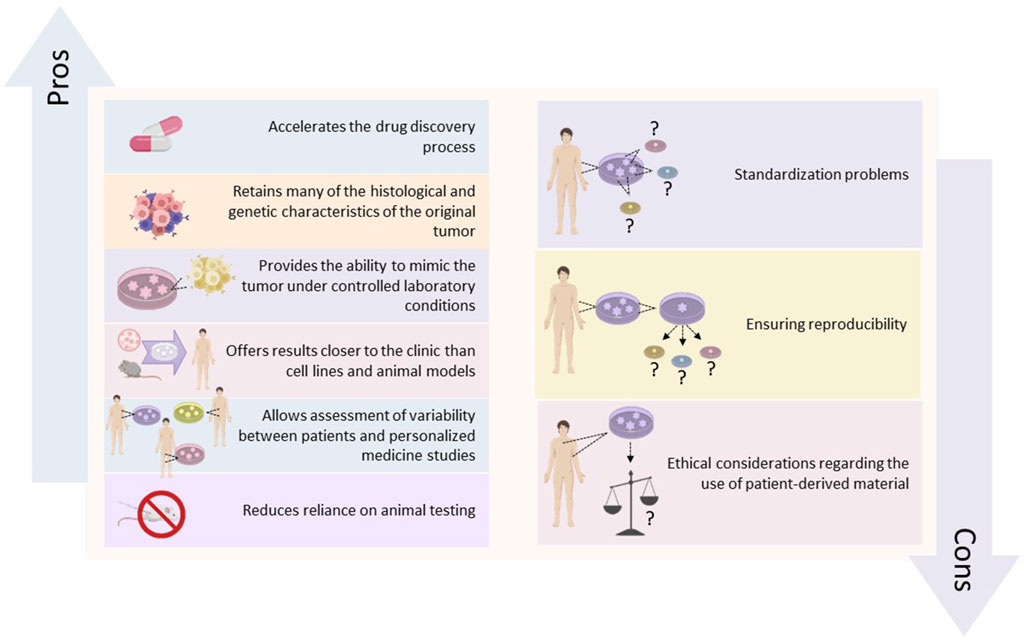
The Rise of Personalized Medicine
The integration of PDOs into personalized medicine is not just a trend but a necessity. By tailoring treatments to the individual genetic profiles of patients, these organoids are revolutionizing how clinicians approach cancer therapy. This shift towards a more personalized strategy is anticipated to enhance treatment efficacy while reducing side effects.However, the application of PDOs is not without challenges. Scaling up organoid cultures, ensuring consistent results, and addressing ethical concerns related to the use of patient-derived materials are significant hurdles that researchers must overcome. These challenges underscore the importance of a multidisciplinary approach, involving collaboration across fields such as oncology, biology, pharmacology, and ethics.
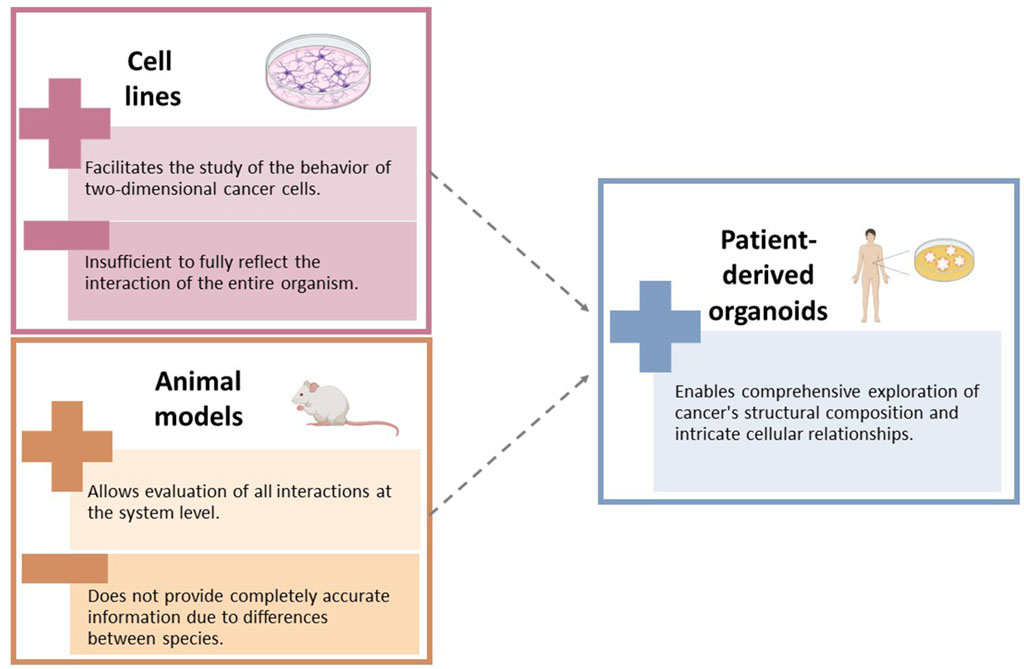
Technological Advancements
Recent biotechnological advancements have propelled the field of PDOs forward. Innovations in organoid culturing, such as the use of synthetic hydrogels and microfluidic systems, are enhancing the reproducibility and scalability of these models. Moreover, the integration of 3D bioprinting technology allows for the creation of complex structures that more accurately reflect the tumor microenvironment, including vascular networks crucial for studying anticancer drug effects.Despite these technological strides, the full potential of PDOs in cancer research is yet to be realized. The scientific community continues to address challenges related to cost, accessibility, and standardization to ensure broader adoption in research and clinical settings.

Future Perspectives
As the oncology landscape evolves, PDOs are set to play a pivotal role in the future of cancer treatment. They hold the promise of bridging the gap between preclinical studies and clinical outcomes, ultimately enhancing patient care worldwide. The continued investment in research and the development of robust regulatory frameworks will be crucial in overcoming current obstacles and unlocking the transformative potential of PDOs.For more insights into the potential of patient-derived organoids in drug development, visit the original article.
The AI Revolution in Dermatology: A Systematic Review
The AI Revolution in Dermatology: A Systematic Review
In a groundbreaking study published in Nature, researchers have delved into the burgeoning field of artificial intelligence (AI) in dermatology, specifically examining its role in diagnosing skin cancer. The study, titled “A Systematic Review and Meta-Analysis of Artificial Intelligence Versus Clinicians for Skin Cancer Diagnosis,” offers a comprehensive look at how AI stacks up against human clinicians in this critical area of healthcare.The research highlights a significant trend: AI is rapidly becoming a valuable tool in dermatology, offering diagnostic capabilities that rival those of experienced dermatologists. The study’s findings are based on a meticulous systematic review and meta-analysis of numerous studies that compare AI algorithms with clinicians in diagnosing skin cancer.
AI’s Diagnostic Performance
The study reveals that AI algorithms demonstrate comparable sensitivity and specificity to dermatologists. This finding is particularly noteworthy as it suggests that AI can serve as an effective diagnostic aid, especially for non-expert clinician groups. In fact, when AI-assisted tools were employed, there were significant improvements in diagnostic accuracy for these groups.This comprehensive analysis underscores the potential of AI to enhance diagnostic precision, a crucial factor in early skin cancer detection. The implications are profound, suggesting that AI could play a pivotal role in improving healthcare outcomes for patients worldwide.
Implications for Clinical Practice
While the study affirms AI’s effectiveness in clinical settings, it also emphasizes the need for further prospective, real-world evaluations. These evaluations are essential to substantiate AI’s practical application in dermatological diagnostics. The integration of AI into clinical practice could aid less experienced practitioners, providing them with the tools to make more accurate diagnoses and ultimately improve patient care.For more detailed insights, the full study is accessible here.
Future Prospects
As AI continues to evolve, its role in dermatology is expected to expand. The study’s findings pave the way for further research and development in AI-assisted diagnostic tools, which could revolutionize the field of dermatology. The potential for AI to assist in early detection and treatment of skin cancer is immense, promising a future where technology and healthcare work hand in hand to save lives.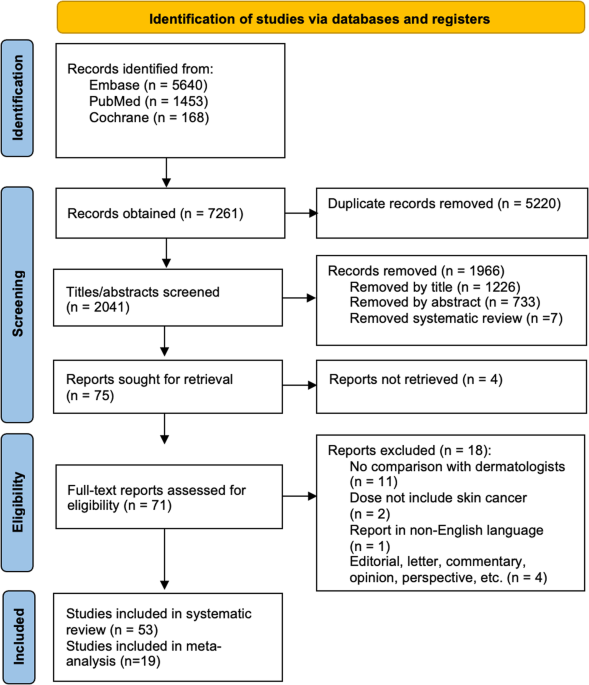
Conclusion
This study marks a significant milestone in the integration of AI into dermatological practice. By demonstrating AI’s potential to match, and in some cases, enhance the diagnostic skills of human clinicians, it sets the stage for a future where AI is an indispensable part of medical diagnostics.For further reading, explore the references cited in the study: Reference 1, Reference 2, Reference 3, and Reference 4.
“`
The Fast Lane to Fully Autonomous Vehicles: Industry Innovations and Future Prospects

Industry Insights: What’s New in Autonomous Driving?
The automotive world is abuzz with announcements from major players like Tesla, Rimac, Renault, and Nissan, each unveiling plans to introduce autonomous vehicles in the near future. Tesla’s much-anticipated “CyberCab” is set for an October 2024 debut, while Rimac and Renault are gearing up for releases in 2026. Nissan’s ambitious rollout of autonomous-drive mobility services by 2027 aims to serve both urban and rural areas in Japan.Understanding the Levels of Automation
The journey towards fully autonomous vehicles is marked by progressive levels of automation, each reducing the need for human intervention. Here’s a brief overview:- Level 1 to Level 2: Systems assist with steering and acceleration/braking, but drivers must remain vigilant.
- Level 2 to Level 3: Vehicles can handle all driving tasks under specific conditions, with drivers ready to take over if needed.
- Level 3 to Level 4: Cars manage all functions independently within defined areas, though manual control is still possible.
- Level 5: Full automation is achieved, eliminating the need for human intervention entirely.
Key Players and Technological Advancements
In 2024, a significant majority of vehicles in Europe and America will feature Level 1 autonomous driving capabilities. Car manufacturers are focusing on developing Level 2 and Level 3 vehicles, with companies like BMW, Hyundai-Kia, and Stellantis leading the charge. Meanwhile, tech giants such as Google and Amazon are also making strides in the autonomous vehicle market, often through strategic partnerships and joint ventures.Transforming Vehicle Interiors
As autonomous technology advances, the interior of vehicles is undergoing a remarkable transformation. FORVIA, a leader in automotive technology, is pioneering innovations to enhance safety, comfort, and personalization in autonomous vehicles. From smart surfaces and innovative interfaces to full cabin infotainment systems, the focus is on creating an experience akin to a mobile living room.Global Collaborations and Regulatory Progress
The development of autonomous vehicles is a global effort, with manufacturers forming alliances to share technology and mitigate costs. Regions like Asia are heavily investing in infrastructure to support autonomous vehicles, while states such as California and Arizona in the U.S. provide flexible regulatory environments for testing.Regulatory frameworks are crucial for the safe deployment of these technologies. Countries like Germany and states in the U.S. are paving the way with laws that permit real-world testing and operation of Level 4 autonomous vehicles, setting the stage for broader adoption.
Futureproofing for Insurers: The Role of AI and Hyper-Personalization
Futureproofing for Insurers: The Role of AI
In a rapidly evolving industry, insurance companies are turning to artificial intelligence (AI) and hyper-personalization to stay ahead of the curve. As noted in a recent article from PropertyCasualty360, these technological advancements are reshaping how insurers engage with customers, assess risks, and enhance operational efficiency.AI and Customer Engagement
By leveraging AI-driven insights, insurers can now customize policies to align with the unique needs of their clients. This shift towards hyper-personalization not only fosters stronger customer loyalty but also enhances satisfaction through personalized coverage options and real-time adjustments.

The Importance of Decision Platforms
While the potential of AI is vast, experts emphasize the need to operationalize these technologies effectively through decision-making platforms. This approach ensures that AI delivers tangible benefits rather than being overshadowed by trendy terms like generative AI.
Modernization and Hyper-Personalization
The trend of modernization within the insurance sector is being driven by AI, with a notable shift towards hyper-personalization. This approach allows insurers to better meet customer expectations, ultimately improving satisfaction and loyalty.
As the industry continues to evolve, the integration of AI and personalization strategies will be crucial for insurers aiming to futureproof their operations and maintain a competitive edge.
Revolutionizing Healthcare: The Power and Potential of AI
AI’s Role in Healthcare
AI technology offers a multitude of benefits, from enhancing patient outcomes to reducing healthcare costs and improving population health. Its application ranges from preventive screenings to complex diagnostic procedures, marking a new era in medical care.Preventive Care and Diagnosis
In the realm of preventive care, AI is making significant strides. For instance, cancer screenings utilizing radiology, such as mammograms, can leverage AI to deliver faster and more accurate results. The Mayo Clinic has demonstrated AI’s prowess in automating labor-intensive tasks, like analyzing kidney images for polycystic kidney disease, reducing the time from 45 minutes to mere seconds.Risk Assessment and Chronic Disease Management
AI’s capabilities extend to risk assessment, particularly in cardiology. A study by Mayo Clinic revealed AI’s success in identifying individuals at risk of left ventricular dysfunction, a condition often without symptoms. This highlights AI’s potential in predicting diseases and guiding early interventions.AI’s Impact on Efficiency and Accuracy
AI is not only about speed but also accuracy. In some cases, AI has outperformed traditional methods in predicting outcomes, such as survival rates in malignant mesothelioma cases. It also plays a crucial role in identifying colon polyps, enhancing the accuracy of colonoscopies.Supporting Healthcare Professionals
While AI offers remarkable efficiency, it complements rather than replaces healthcare professionals. The American Medical Association emphasizes “augmented intelligence,” where AI assists in routine tasks, allowing practitioners to focus on more critical aspects of patient care.Challenges and Future Directions
Despite its promising potential, AI in healthcare is not without challenges. Issues like bias and misinformation necessitate effective regulation. The Health AI Partnership aims to address these concerns, ensuring AI’s equitable and safe integration into healthcare.Looking ahead, AI could transform medical practices by selecting patients for clinical trials, developing remote health-monitoring devices, and predicting disease risks years in advance. As Mayo Clinic continues to explore AI’s capabilities, the future of healthcare looks promisingly intelligent.

Exploring the Top Real Estate Trends of 2024
Exploring the Top Real Estate Trends of 2024
As we navigate the ever-evolving landscape of real estate, 2024 presents a fascinating array of trends that are reshaping the industry. According to a comprehensive report by Exploding Topics, nine pivotal trends are poised to redefine the market over the next 18-24 months.1. Home Prices Continue to Climb
The quest for single-family homes is driving prices skyward, with a staggering 43% increase over the past four years. This surge, while beneficial for existing homeowners, poses significant challenges for first-time buyers. The average US homeowner saw a 9.6% equity increase last year, adding $1.5 trillion collectively. However, a cooling trend is emerging, as median prices declined in early 2024.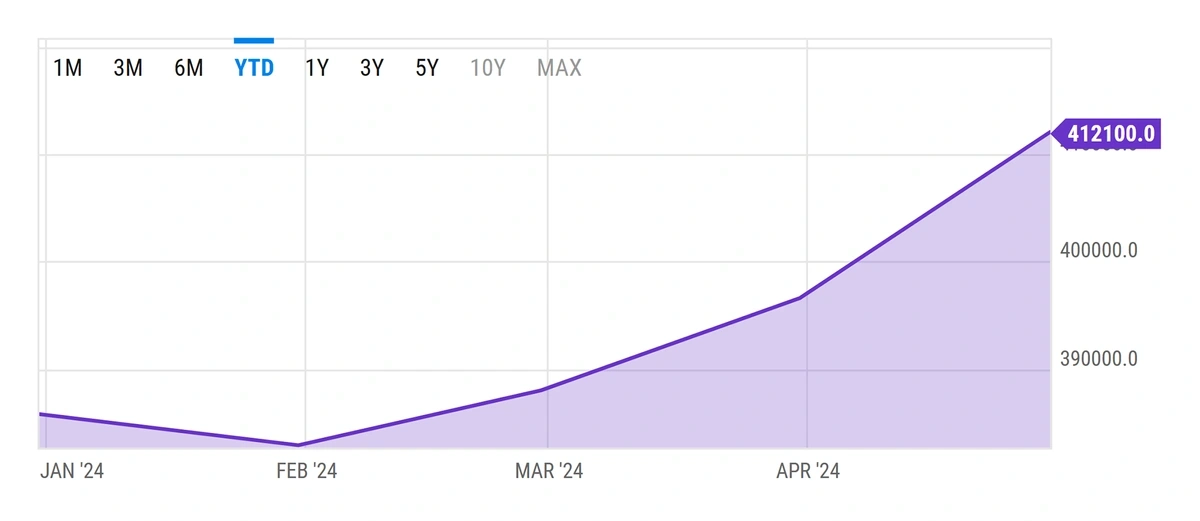
2. The Sun Belt’s Rising Popularity
The Sun Belt, stretching from California to North Carolina, is experiencing a population boom. With 80% of the nation’s growth concentrated here, the region’s appeal is undeniable. Lower taxes and affordable housing are drawing both retirees and young professionals. Cities like Dallas and Tampa are now among the top ten US cities for real estate potential.
3. Digital-First House Hunting
The digital transformation of real estate is in full swing. Virtual tours, drone videos, and online staging are revolutionizing how buyers interact with properties. The National Association of Realtors highlights that the internet is the starting point for 41% of buyers, underscoring the shift to digital-first strategies.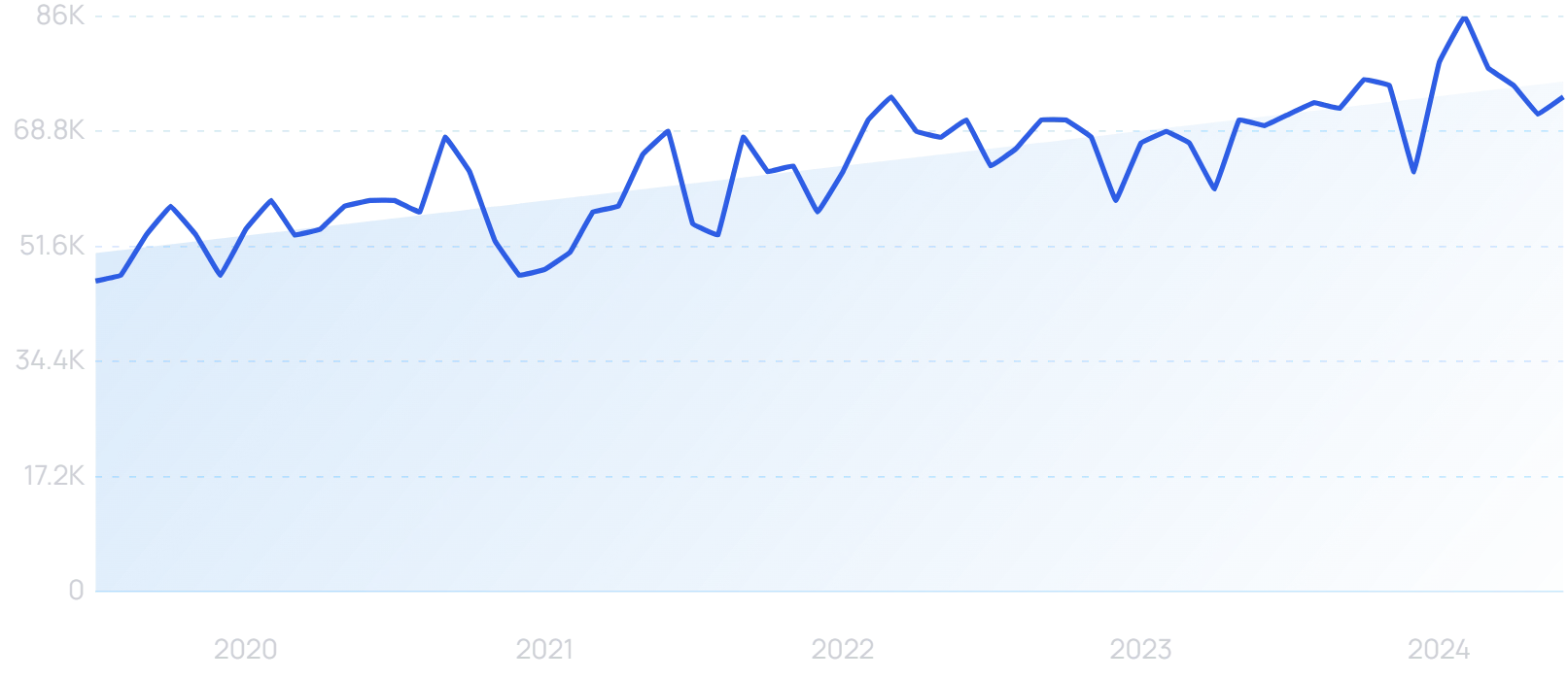
4. Movement from Cities to Suburbs
The suburban migration continues, driven by affordability and remote work flexibility. The US Census Bureau reports a significant shift towards smaller cities and suburbs, with “middle neighborhoods” offering a blend of suburban and urban amenities.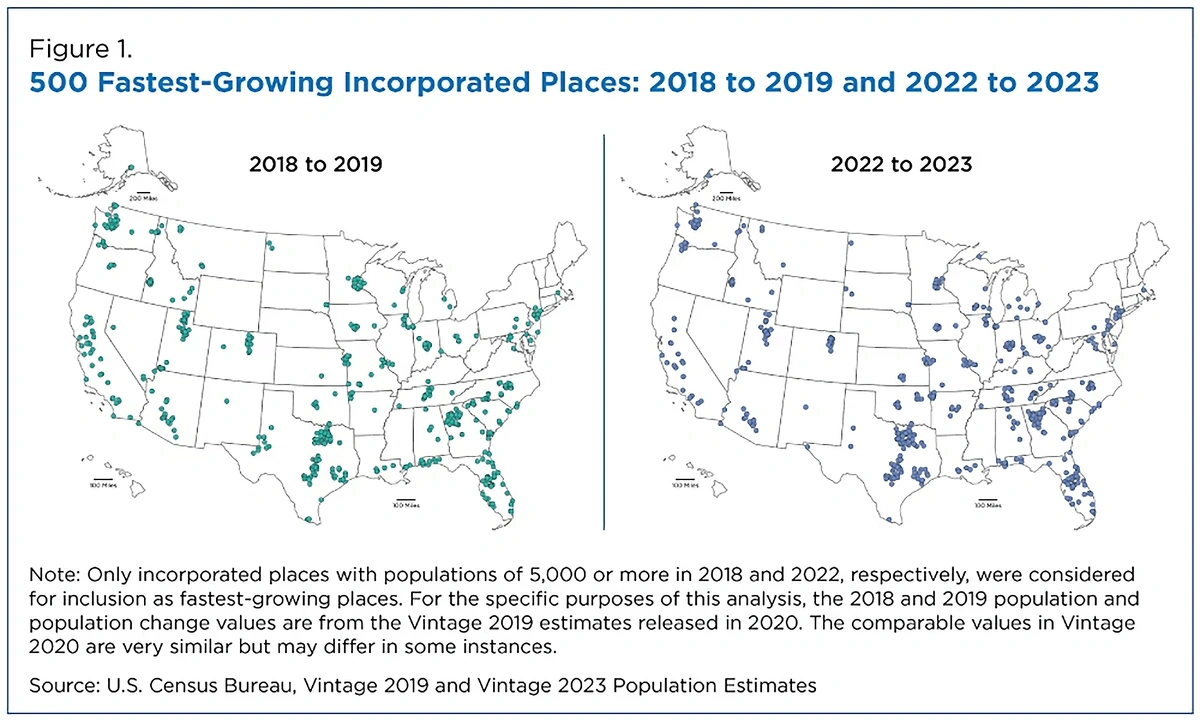
5. Single-Family Housing Demand Creates Shortages
The demand for single-family homes is outpacing supply, with a gap of over 7 million homes since 2012. This shortage is exacerbated by millennials entering the housing market and institutional investors purchasing a significant share of available homes.
6. Multi-Generational Living on the Rise
Economic pressures and cultural shifts are driving an increase in multi-generational households. This trend is particularly notable among immigrant communities and is reshaping the housing landscape.7. Mortgage Rates Remain High
Mortgage rates, which once hit record lows, have climbed to around 7% in 2024. This rise is making home buying more expensive and impacting monthly payments for variable-rate mortgages. Fannie Mae forecasts a slight decrease in rates over the coming years.8. Decline in the Rental Property Market
The rental market in major cities is experiencing a downturn as more people seek homeownership or alternative living arrangements. However, mid-size and smaller cities are witnessing rising rental demand as housing supply struggles to keep up.9. Commercial Real Estate in Flux
Changing work patterns continue to impact commercial real estate. While office vacancies are high, opportunities are emerging in retail and multi-family properties. Moody’s Analytics notes a positive trend in neighborhood shopping centers.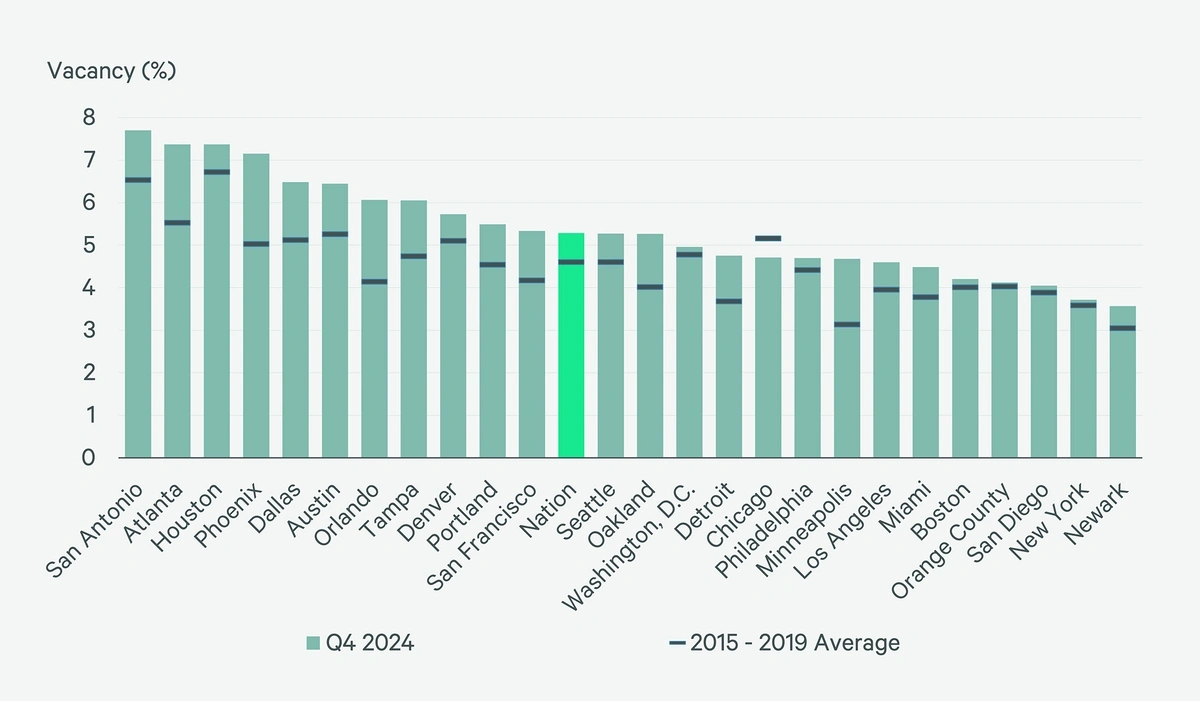
Conclusion As these trends unfold, they present both challenges and opportunities within the real estate market. While high prices and mortgage rates may deter some buyers, the shifts to digital platforms and suburban living offer new avenues for growth and investment. For more insights, explore the full report on Exploding Topics.
The Rapid Evolution of Telehealth Under Medicare
The Rapid Evolution of Telehealth Under Medicare
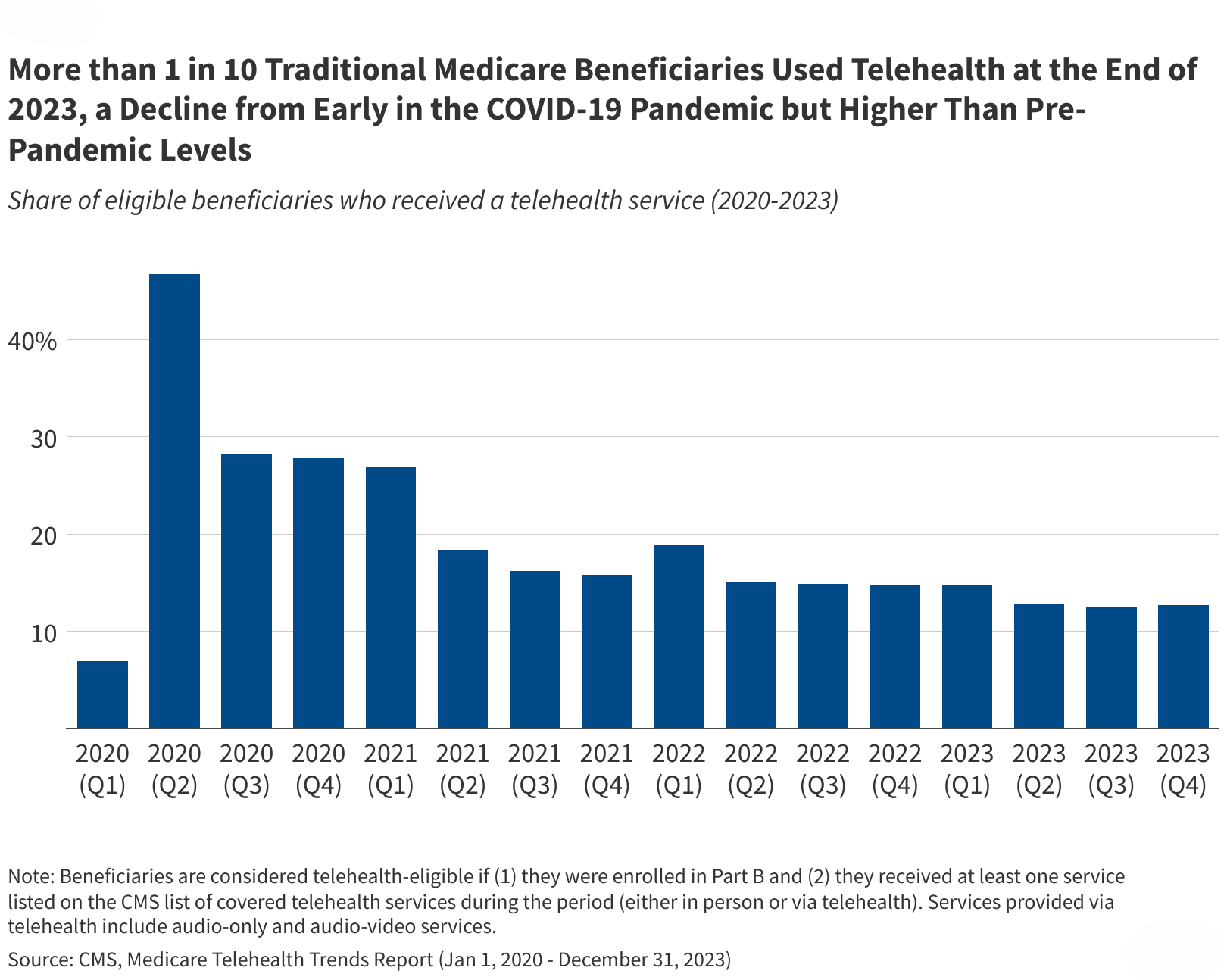 The landscape of healthcare has dramatically shifted in recent years, with telehealth emerging as a key player in the delivery of medical services. This transformation has been particularly evident in the realm of Medicare, where telehealth has seen a significant uptick in utilization. The Kaiser Family Foundation recently highlighted this trend, noting the legislative changes and policy shifts that have facilitated the growth of telehealth services for Medicare beneficiaries.
The landscape of healthcare has dramatically shifted in recent years, with telehealth emerging as a key player in the delivery of medical services. This transformation has been particularly evident in the realm of Medicare, where telehealth has seen a significant uptick in utilization. The Kaiser Family Foundation recently highlighted this trend, noting the legislative changes and policy shifts that have facilitated the growth of telehealth services for Medicare beneficiaries.
The Pandemic’s Role in Telehealth Expansion
Prior to the onset of the COVID-19 pandemic, telehealth was a relatively niche service within Medicare, primarily available to those in rural settings. However, the public health emergency necessitated rapid adaptation, leading to a dramatic increase in telehealth utilization. Temporary measures were introduced, allowing for broader access and coverage, as detailed in the Medicare Telehealth Report. These changes not only increased access but also highlighted the potential of telehealth to address healthcare disparities.Legislative Measures and Future Prospects
With the official end of the COVID-19 public health emergency on May 11, 2023, Congress faces the challenge of deciding the future of these telehealth flexibilities. There is bipartisan support for extending these measures, as seen in proposed legislation like the Preserving Telehealth, Hospital, and Ambulances Act. However, the majority of these flexibilities are set to expire by December 2024, prompting ongoing discussions about the potential for permanent expansion.Demographic Disparities in Telehealth Usage
The adoption of telehealth services varies significantly across different demographics. Urban areas have seen higher rates of telehealth use compared to rural regions, likely due to disparities in broadband access and communication technologies, as noted in a Brookings article. Additionally, usage is higher among Asian, Pacific Islander, and Hispanic beneficiaries, suggesting that telehealth may play a role in improving access to care for certain groups.The Financial Implications
Medicare’s payment structure for telehealth services has also evolved, with current rates matching those of in-person visits. This parity is crucial for encouraging providers to invest in telehealth infrastructure. However, questions remain about the long-term financial impact on the Medicare program. The Congressional Budget Office has estimated the cost of extending telehealth flexibilities, and ongoing research is needed to assess the balance between increased spending and potential savings from reduced emergency department visits and improved medication adherence.Ensuring Program Integrity
As telehealth becomes more entrenched in the Medicare landscape, concerns about program integrity and potential fraud have arisen. Despite some high-profile cases, investigations have shown minimal evidence of widespread misuse. Recommendations from the MedPAC include increased scrutiny of outlier billing patterns and in-person visit requirements for high-cost services.In conclusion, while telehealth has proven to be a valuable tool for expanding access to healthcare, its future within Medicare remains uncertain. The ongoing legislative discussions will determine whether the current flexibilities will become a permanent fixture, shaping the healthcare landscape for years to come.
The Rise of Central Bank Digital Currencies: Reshaping Global Finance
Understanding the Emergence of Central Bank Digital Currencies
Central bank digital currencies (CBDCs) are reshaping the financial landscape, emerging as a pivotal innovation in the digital age. Unlike decentralized cryptocurrencies, CBDCs are digital forms of a nation’s fiat currency, issued and regulated by central banks. This distinction ensures stability and trust, akin to traditional money.Exploration and Implementation
Around the globe, countries are actively exploring the integration of CBDCs into their financial systems. This forward-thinking move aims to enhance financial inclusion, streamline cross-border transactions, and provide a stable alternative to the volatile cryptocurrency market. Nations such as Jamaica, Nigeria, and The Bahamas have already implemented CBDCs, signaling a new era in digital finance. These currencies maintain the core attributes of fiat money while leveraging the efficiencies of distributed ledger technologies.:max_bytes(150000):strip_icc()/terms_c_central-bank-digital-currency-cbdc_FINAL-671aefb2905b407583007d63fa46e49d.jpg)
Key Advantages of CBDCs
CBDCs offer a myriad of benefits. For consumers, they promise enhanced convenience and security in financial transactions, reducing dependence on physical cash. Central banks, meanwhile, gain a powerful tool to implement monetary policies, manage inflation, and establish direct connections with the public. Additionally, CBDCs can bolster the global standing of a nation’s currency, exemplified by the enduring influence of the U.S. dollar.Challenges and Considerations
The path to widespread CBDC adoption is not without its challenges. Concerns about privacy, cybersecurity, and the impact on existing financial systems are paramount. These issues must be addressed to prevent potential destabilization of current monetary frameworks. As highlighted in the original article, the balance between innovation and stability is crucial.The Way Forward
Despite these hurdles, the move towards digital currencies marks a transformative phase for global economies. As more countries embark on pilot programs and develop the necessary technological infrastructure, the financial landscape continues to evolve. This evolution promises a more inclusive and efficient future for transactions and economic operations worldwide.For a deeper dive into the intricacies of CBDCs and their global impact, visit the comprehensive exploration available at Investopedia. “`
Navigating Real Estate Tactics: Protecting Your Interests
Tricks Real Estate Agents Play
Real estate transactions often involve significant sums of money, making them prime targets for unscrupulous tactics. Here are some of the most common strategies that both buyers and sellers should watch out for:1. Convincing Homeowners to Sell Off Market
Some agents may persuade homeowners to sell their property off market. This tactic is often aimed at properties that need updates or renovations. By convincing the seller to avoid listing the property, the agent can facilitate a private sale to an investor, often at a price substantially lower than market value—sometimes 20% to 40% less. This allows the investor to reap the profits that rightfully belong to the seller.2. Overpromising on the Listing Price
Agents may exaggerate the potential selling price of a property to secure a listing. This can lead to homes languishing on the market, eventually selling for less than their true value. Sellers should be cautious and seek multiple opinions on their property’s worth.3. Underquoting
Conversely, underquoting involves listing a property at a price much lower than its expected selling price to attract more buyers. This can create a competitive bidding environment, driving up the final sale price. Buyers should be aware that initial quotes might be 10% to 25% below the actual selling price.4. Vague Pricing
Some agents use vague pricing to gauge buyer interest and encourage competitive bidding. This tactic can mislead buyers, who should insist on clear and transparent pricing information.5. Tactical Fear of Loss
Creating a sense of urgency is another common strategy. Agents may suggest that other buyers are interested in the property, triggering a Fear of Missing Out (FOMO) response. Buyers should remain calm and evaluate their options carefully to avoid making hasty decisions.6. Inflated Rental Estimates
Agents might provide overly optimistic rental income projections to make a property appear more attractive to investors. Buyers should conduct their own research to verify these estimates and avoid relying solely on the agent’s figures.7. Pre-Auction Offers
Encouraging pre-auction offers can be a tactic to gauge a buyer’s willingness to pay. Buyers should be cautious about revealing their maximum price too early and understand the vendor’s motivations.8. Rental Guarantees
Offering a rental guarantee can be a red flag, indicating potential issues with the property or its market demand. Buyers should question the necessity of such guarantees and investigate further.9. Emotional Appeal
Agents may use emotional tactics to connect with buyers, making them more likely to overlook practical considerations. It’s important for buyers to focus on the property’s value and suitability rather than getting swayed by emotional pitches.The Importance of Choosing the Right Agent
Selecting a trustworthy real estate agent is crucial to avoid falling victim to these tactics. Look for agents with the right qualifications, recent experience, outstanding reviews, and a lower-than-average number of dual agency transactions. Ensure there is an easy way to cancel the agent agreement if needed.Advice for Buyers and Sellers
- Do Your Research: Whether buying or selling, conduct thorough research on property values, market trends, and agent reputations.
- Seek Multiple Opinions: Don’t rely on a single agent’s assessment. Get multiple evaluations to ensure a fair understanding of the property’s worth.
- Stay Informed: Educate yourself about common real estate practices and tactics to make informed decisions.
- Engage Professionals: Consider hiring a buyer’s agent or valuer to provide additional protection and ensure a fair deal.
Additional Insights from Resources
- Triple Commission Proposal: Be wary of agents who might be influenced by investors offering higher commissions to secure off-market deals.
- Hidden Offers: Some agents may hide competing offers to favor buyers they have personal connections with.
- Manipulating Offer Timelines: Delayed responses to offers can be a tactic to create pressure or manipulate negotiations.
- Bait Pricing: Listing properties at low prices to generate interest, only to drive the sale price much higher.
- Phantom Offers: Fabricating non-existent offers to pressure buyers into higher bids or quicker decisions.
- Pressure Tactics: High-pressure sales tactics may create a false sense of urgency, pushing buyers into hasty decisions.
- Omitting Crucial Information: Withholding important property details can leave buyers unaware of potential problems.
Global Surge in Wearable Healthcare Devices Market
Global Surge in Wearable Healthcare Devices Market
The global wearable healthcare devices market is on a remarkable growth trajectory, projected to escalate from USD 39.9 billion in 2023 to an impressive USD 114.8 billion by 2033. This surge, at a compound annual growth rate (CAGR) of 11.15%, underscores the increasing demand for proactive health management and advancements in sensor technology.Wearable healthcare devices, including smartwatches and trackers, have become essential tools for individuals eager to monitor and manage their health proactively. These devices are more than just fitness trackers; they offer a multitude of functions such as heart rate monitoring, smartphone notifications, and integration with third-party applications. However, the continuous health monitoring they provide raises significant concerns about the security and privacy of sensitive health data.
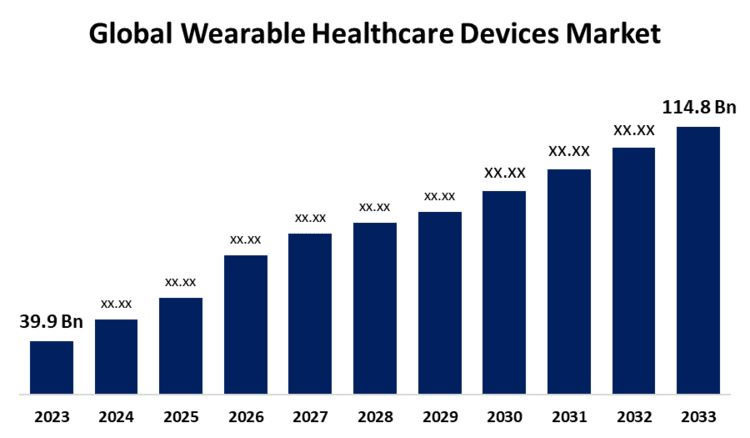
Market Segmentation and Trends
The market is categorized by product types, applications, and distribution channels. Smartwatches are anticipated to lead the product segment, while the general health and fitness application segment is expected to dominate due to the growing focus on real-time health monitoring. E-commerce emerges as the leading distribution channel, facilitating the availability of these devices through digital platforms.Geographical Insights
North America holds the largest market share, driven by favorable reimbursement laws, high per capita spending on advanced technologies, and significant investments by market players. Meanwhile, the Asia-Pacific region is expected to experience the fastest growth, propelled by initiatives to reduce patient hospital stays in countries like China, Japan, and India.Competitive Landscape
The competitive landscape features major vendors such as Dr. Reddy’s Laboratories Ltd, Samsung Electronics, Huawei Technologies, Fitbit, and Apple. These companies continue to innovate and collaborate, fueling the market’s expansion. A notable development is the introduction of Nerivio, a non-invasive wearable for managing migraines, by Dr. Reddy’s Laboratories in Germany, marking its expansion in the European digital therapy market.For those interested in delving deeper, the complete report and related documents are accessible through the following link. This information is crucial for stakeholders aiming to strategize and capitalize on burgeoning opportunities within the wearable healthcare devices marketplace.
Generative AI: Transforming the Real Estate Landscape
In the ever-evolving world of real estate, the advent of Generative AI is set to redefine the roles of industry professionals. As reported by Forbes, this transformative technology is not just a futuristic concept but a present-day reality poised to automate routine tasks and enhance property analysis.
The Impact on Real Estate Professionals
Generative AI is revolutionizing the way real estate agents, appraisers, and brokers operate. By automating tasks such as creating property descriptions and analyzing market trends, AI tools are freeing up professionals to focus on strategic, high-value responsibilities. This shift is expected to generate up to $180 billion in value for the industry, according to a McKinsey report.
Automation and Efficiency
Real estate agents can now leverage AI to quickly generate personalized property listings using computer vision to analyze photographs and floor plans. In addition, chatbots are handling customer service inquiries, scheduling tours, and even assisting with mortgage applications. This level of automation not only enhances efficiency but also allows professionals to dedicate more time to building client relationships.
Ethical Considerations
While AI brings numerous advantages, it also introduces ethical challenges. Professionals must ensure that AI usage complies with local laws and regulations, particularly when it comes to marketing and data protection. Transparency is key, especially when AI-generated visuals are used in marketing properties. Real estate agents must clearly communicate to clients when they are viewing AI-generated content.
The Future of Real Estate in an AI-Driven World
As AI continues to handle routine tasks, the demand for professionals with strong communication and problem-solving skills is set to rise. Those who can effectively integrate AI tools into their workflows will likely emerge as industry leaders. While some entry-level roles may be at risk, new opportunities such as prompt engineering and technology integration are expected to arise.
The real estate industry, driven by competition, will see AI become an indispensable part of the professional toolkit. Those who adapt and leverage these technologies are likely to find themselves at the forefront of the industry.
AI Assistance in Radiology: A Nuanced Tool for Diagnostic Precision
AI Assistance in Radiology: A Nuanced Tool for Diagnostic Precision
In a groundbreaking study published by Nature on March 19, 2024, researchers have unveiled the complex dynamics of artificial intelligence (AI) assistance in radiology, emphasizing the need for personalized strategies to harness its full potential. The study, titled “Heterogeneity and Predictors of the Effects of AI Assistance on Radiologists,” delves into how AI impacts diagnostic accuracy across a diverse group of clinicians.The research, conducted on 140 radiologists performing 15 diagnostic tasks, highlights significant variability in AI’s effectiveness. This variation underscores the necessity for tailored approaches in clinical settings to optimize AI’s benefits. The study’s findings are pivotal, as they suggest that a one-size-fits-all approach to AI assistance in healthcare may not be effective.
One of the critical insights from the study is the heterogeneous nature of AI’s impact, which varies significantly based on individual clinician characteristics and the quality of AI predictions. This variability suggests that while some radiologists may experience enhanced diagnostic accuracy with AI assistance, others might not benefit as much, or could even be hindered by it.
The study is part of a growing body of research exploring AI’s role in healthcare. For instance, earlier works like CheXNet and Deep Learning for Chest Radiograph Diagnosis have paved the way for understanding AI’s capabilities in medical imaging. This latest research builds on these foundations, offering a more nuanced view of AI’s role in clinical practice.
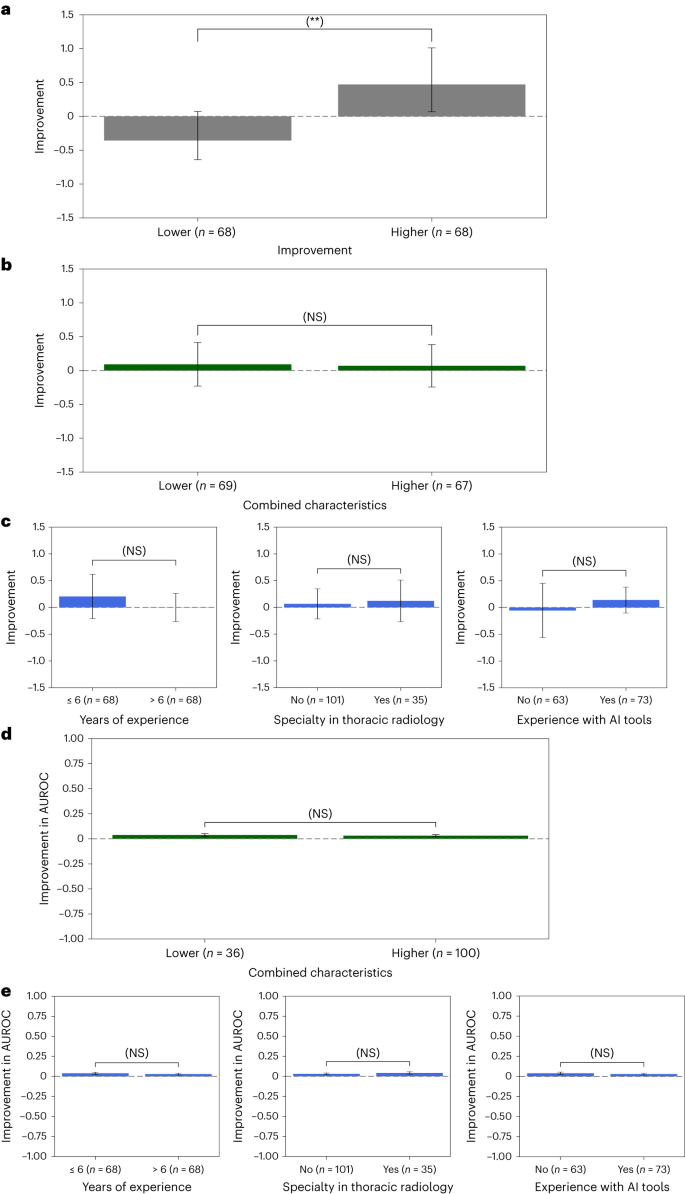
Key Takeaways:
- AI assistance in radiology shows significant variability in effectiveness across different radiologists.
- Individualized strategies are crucial for optimizing AI’s benefits in clinical settings.
- Quality of AI predictions plays a significant role in determining its impact on diagnostic accuracy.
The study’s findings are a call to action for healthcare providers and AI developers to collaborate closely. By understanding the factors that influence AI’s effectiveness, they can develop more refined tools that cater to the unique needs of each clinician. This approach not only enhances diagnostic precision but also fosters greater trust and acceptance of AI in healthcare.
For more detailed insights, you can access the full study on Nature’s website.
Enroll in Cameron Academy’s 63-Hour Pre-License Real Estate Course Starting December 2024
If you are seeking to embark on a career in the real estate industry, the Cameron Academy offers a comprehensive in-person Florida Real Estate Sales Associate 63-Hour Pre-License Course starting on December 2, 2024. This course is meticulously designed to equip aspiring real estate professionals with the skills and knowledge necessary to thrive in Florida’s dynamic real estate market.
Course Schedule & Location
- Dates: December 2nd to December 13th, 2024
- Times: 5 PM to 10 PM EST
- Days: Monday to Friday
- Location: 7009 Dr. Phillips Blvd #110, Orlando, Florida 32819
The course will be held at Cameron Academy’s main campus, offering a prime location for learners to immerse themselves in the educational experience.

Course Features
This in-person class provides a comprehensive curriculum covering essential real estate topics. Participants will benefit from:
- Expert instructors with extensive industry experience
- Interactive study materials that enhance learning
- Classroom textbook available in both physical and digital formats
- An online final exam requiring a 70% passing grade
These features are designed to ensure participants gain a robust understanding of real estate fundamentals, preparing them for successful careers.
Enrollment Benefits
Enrolling in Cameron Academy’s pre-license course comes with numerous advantages:
- Receive an instant certificate upon course completion
- Access to a wealth of study materials and resources
- Optional background check and fingerprinting services available at an additional cost
These benefits are aimed at smoothing the transition from education to professional practice, offering support at every step.
Eligibility Requirements
Prospective students must meet the following criteria:
- Be at least 18 years old
- Possess a high school diploma or equivalent
- Have a valid Social Security number
- Exhibit good character and a reputation for fair dealing
Ensuring these requirements are met is crucial for a successful enrollment process.
Why Choose Cameron Academy?
Cameron Academy stands out as Florida’s top-rated real estate school, boasting over 3,000 5-star reviews. The academy is renowned for its flexible delivery methods and outstanding customer service, making it the ideal choice for aspiring real estate professionals.
For those interested in joining this esteemed institution, enrollment is now open. Secure your spot early, as spaces are limited. Visit our event page for more information and to register.
For further inquiries, contact Cameron Academy at 220-CAMERON (226-3766) from Monday to Friday, 9 AM to 5 PM.
Additional Resources and Support
For more details on course offerings, FAQs, and additional support, explore our website or reach out directly through our contact page. Our dedicated support team is ready to assist you in taking the first step towards mastering real estate with confidence and expertise.
Visit the Cameron Academy’s Website for a broader overview of all real estate courses offered, including the December 2nd class.
Advice for Aspiring Real Estate Professionals
Entering the real estate industry can be a rewarding venture. Here are some tips to help you succeed:
- Network: Building connections within the industry is vital. Attend events and engage with peers and mentors.
- Stay Informed: Keep up with market trends and changes in real estate laws and regulations.
- Continuous Learning: Consider further certifications and courses to expand your knowledge and skills.
By following these suggestions, you can enhance your career prospects and establish yourself as a competent and successful real estate professional.
Exploring the Future: AI Projects for All Levels
Exploring the Future: AI Projects for All Levels
In a world where technology is rapidly evolving, Artificial Intelligence (AI) is at the forefront, reshaping industries and altering our everyday lives. Recently, Simplilearn published an insightful article detailing the top 30 AI project ideas for 2025, offering a comprehensive guide for enthusiasts from beginners to advanced practitioners.Impact of AI Across Industries
AI’s transformative power is evident across multiple sectors. In healthcare, AI-driven diagnostics and personalized medicine are revolutionizing patient care. The financial industry benefits from enhanced fraud detection and risk assessment capabilities. Manufacturing sees improvements through predictive maintenance and optimized production processes, while transportation is becoming safer with autonomous vehicles and intelligent traffic systems. Education is also being personalized, making learning more accessible.
However, AI’s influence extends beyond industry-specific applications. It is reshaping the job market, demanding new skills and creating innovative opportunities. This technological shift brings with it ethical and social concerns, such as privacy and job displacement, necessitating careful management and regulation.
Beginner to Advanced AI Projects
For those eager to dive into AI, the article outlines a series of projects that cater to different skill levels. Beginners can start with projects like a Spam Email Detector or Sentiment Analysis of Product Reviews. These projects introduce fundamental AI concepts using machine learning algorithms like Naive Bayes.
Intermediate projects such as a Chatbot for Customer Service or an Image Classification System allow developers to delve deeper into natural language processing and computer vision. Meanwhile, advanced projects like an Autonomous Driving System or AI-Based Medical Diagnosis System require a sophisticated understanding of AI and machine learning algorithms.
Building a Career in AI
Embarking on a career in AI involves a blend of education, practical experience, and continuous learning. The article suggests starting with a strong foundation in mathematics and computer science, followed by engaging in practical projects and participating in competitions on platforms like GitHub. Specializing in areas like robotics or natural language processing can further enhance one’s career prospects.
For those looking to formalize their education, Simplilearn offers a Professional Certificate Program in AI and ML in collaboration with Purdue University, designed to equip learners with the necessary skills to thrive in this dynamic field.
Conclusion
Delving into AI projects is a thrilling journey of creativity and development. For those seeking to deepen their understanding and mastery of AI, Simplilearn’s Post Graduate Program in AI and Machine Learning offers a comprehensive curriculum, real-world projects, and practical learning experiences.
FAQs: Navigating the AI Landscape
What is the difference between machine learning and deep learning?
Machine learning, a subset of AI, enables computers to learn from data. Deep learning, a further specialization, uses multi-layered neural networks for more complex pattern recognition.Can AI replace human jobs, or will it create new opportunities?
While AI can automate tasks, potentially displacing jobs, it also creates roles in development, maintenance, and oversight, emphasizing the need for skills adaptation.How to learn AI for free?
Simplilearn’s SkillUp resources offer free learning opportunities for those seeking to enhance their AI knowledge.AI’s Transformative Role in Healthcare: The 2023 Shift in Patient Diagnostics
The Dawn of AI-Driven Diagnostics
AI has not only automated certain diagnostic tasks but, more importantly, augmented the abilities of medical professionals in making informed decisions. By swiftly analyzing vast amounts of data, AI assists in identifying diseases in their early stages, allowing for prompt and accurate interventions that greatly affect patient outcomes.Case Studies and Real-World Applications
In 2024, AI diagnostic tools, especially in the realm of medical imaging, have become remarkably precise. Such tools, leveraging advanced machine learning algorithms, have been recognized with numerous FDA approvals, particularly in radiology. The capability of AI to handle both structured and unstructured data has revolutionized healthcare, making AI indispensable in this field.Impact on Healthcare Delivery
The implications of AI integration in healthcare extend beyond mere diagnostics, redefining the essence of patient care itself. AI enables more personalized and effective treatment regimens, greatly enhancing patient experiences. By analyzing comprehensive patient data, AI facilitates personalized care, transcending the traditional one-size-fits-all approach and ensuring that treatments are tailored to individual needs.Personalization at the Forefront
One remarkable aspect of AI’s application in healthcare is its ability to enhance the accuracy of treatment plans. Through pattern recognition and data correlation, AI predicts the most effective treatments, minimizing trial and error. This significant improvement saves both time and resources in healthcare delivery.Real-world examples in 2024 illustrate the success of AI-driven treatment plans, particularly in oncology, where AI models integrate diverse types of clinical data. These models precisely predict treatment outcomes and personalize cancer care, advancing precision medicine.
Navigating Ethical Complexities
However, with these advancements come challenges, notably ethical and privacy concerns. As AI technology continues to evolve, issues surrounding data privacy, algorithmic bias, and the moral implications of AI decisions need addressing. Fairness, transparency, and respect for patient data confidentiality are crucial.Data Privacy and Security
With AI systems processing vast amounts of personal health data, safeguarding this information is critical. The industry faces the challenge of protecting patient data while harnessing AI’s potential for improving healthcare outcomes.Algorithmic Bias and Fairness
There’s an ongoing concern about biases in AI algorithms, which can stem from skewed data sets or flawed programming. Ensuring these algorithms are as objective and unbiased as possible is crucial for equitable healthcare delivery.Balancing AI and Human Judgment
Balancing AI with human judgment remains vital, ensuring that AI acts as a valuable tool to support, rather than replace, the expert decisions of medical professionals. As the future of AI in healthcare looks promising, ongoing efforts are essential to address ethical challenges, ensuring AI remains advantageous for all stakeholders in healthcare.Looking Ahead
The future of AI in healthcare is bright, but it necessitates a collaborative effort to address these ethical considerations. As AI continues to evolve, so too must approaches to managing these challenges, ensuring AI remains a beneficial tool for all in healthcare.About the Author: Dr. Liz Kwo, the chief commercial officer of Everly Health, is a recognized entrepreneur in healthcare, a practicing physician, and a faculty lecturer at Harvard Medical School. Her academic credentials include an MD from Harvard Medical School, an MBA from Harvard Business School, and an MPH from the Harvard T.H. Chan School of Public Health.
Unveiling the Future: Technology Trends to Watch in 2025
Unveiling the Future: Technology Trends to Watch in 2025
In an ever-evolving digital landscape, staying ahead of the curve is not just an option but a necessity. As we edge closer to 2025, the technological horizon is brimming with innovations poised to redefine industries and reshape our daily lives. According to a recent article on Simplilearn.com, 25 emerging technology trends are set to dominate the future, urging IT professionals to adopt a mindset of continuous learning and adaptation.Generative AI leads the pack as a transformative force, promising to revolutionize content creation across various sectors. With advancements in models like GPTs, the potential applications are vast, from design automation to interactive experiences. For those keen on diving deeper, Simplilearn offers an Applied Generative AI Specialization.
Quantum Computing is another game-changer, leveraging quantum mechanics to solve complex problems beyond the reach of classical computers. Its implications in cryptography and drug discovery are just the tip of the iceberg. Learn more about this groundbreaking technology in the Quantum Computing Tutorial.
The 5G Expansion continues to gain momentum, enabling transformative technologies like IoT and augmented reality by providing faster data speeds and more stable connections. This expansion is crucial for real-time communications, paving the way for innovations such as autonomous vehicles.
Virtual Reality (VR) 2.0 and Augmented Reality (AR) are set to offer even more immersive experiences, with applications ranging from gaming to education. As hardware evolves, these technologies are expected to become more integrated into our daily lives, enhancing how we interact with the digital world.
The Internet of Things (IoT) plays a pivotal role in smart cities, optimizing everything from traffic management to energy use. IoT technology is essential for managing urban complexities and improving residents’ quality of life.
In agriculture, Biotechnology is making strides with techniques like CRISPR, creating crops that are more resilient to environmental stresses. This is crucial for adapting to climate change and ensuring food security.
The journey doesn’t end here. The article delves into other significant trends, including Autonomous Vehicles, Blockchain Beyond Crypto, Edge Computing, and Personalized Medicine. Each of these technologies holds the promise of reshaping industries and creating new opportunities.
Preparing for Tomorrow’s Job Market
With these technological advancements come new career opportunities. By 2025, roles such as AI Specialist, Quantum Computing Engineer, and 5G Network Engineer will be in high demand. The evolving landscape highlights the importance of acquiring relevant skills to thrive in the future job market.Conclusion
As we navigate through these technological shifts, it becomes clear that the future is not just about adopting new tools but embracing a mindset of constant evolution. By staying informed and adaptable, professionals can position themselves at the forefront of innovation, ready to tackle the challenges and opportunities that lie ahead.Understanding the Legal and Ethical Challenges AI Poses in Oncology
Understanding the Legal and Ethical Challenges AI Poses in Oncology
The field of oncology is undergoing a transformation, driven by the rapid integration of artificial intelligence (AI) technology. These advancements promise unprecedented improvements in cancer detection, personalized treatment strategies, and patient support. However, as the integration of AI into oncology progresses, a myriad of legal and ethical challenges emerges.AI in Diagnosis and Treatment AI tools have been instrumental in enhancing the analysis of medical imaging data, such as MRI scans, CT scans, and mammograms. These algorithms are adept at identifying subtle patterns that might elude human observation, potentially leading to faster and more accurate cancer detection. AI also plays a crucial role in treatment delivery and decision-making, particularly in radiation therapy and immunotherapy regimen design.
Yet, the use of AI in diagnosis raises significant legal questions. Traditionally, human physicians are not held strictly liable for incorrect diagnoses or treatments if their conduct meets the standard of care. However, defining a legal standard for AI-related errors remains uncertain. Some propose a strict liability standard, holding manufacturers accountable for defects without needing to prove fault, while others suggest alternative product liability standards.
 Legal Standards and Liability
The complexity of applying legal standards to AI tools is compounded by their evolving nature. AI algorithms often change as they process more data, challenging traditional product liability frameworks. Different jurisdictions are adopting varied approaches to liability, with the European Commission discussing a proposed AI Liability Directive for high-risk AI systems.
Legal Standards and Liability
The complexity of applying legal standards to AI tools is compounded by their evolving nature. AI algorithms often change as they process more data, challenging traditional product liability frameworks. Different jurisdictions are adopting varied approaches to liability, with the European Commission discussing a proposed AI Liability Directive for high-risk AI systems.
Patient Counseling and Ethical Considerations Beyond diagnostics, AI is also being explored for patient counseling. Studies have evaluated the use of AI chatbots for cancer-related inquiries, with mixed results. While these chatbots can provide helpful information, they are not yet fully ready for patient-facing roles. A recent study found that AI chatbots were as effective as human counselors in educating breast cancer patients about genetic dimensions, suggesting potential in freeing up human resources for more intensive counseling.
However, using AI in patient counseling introduces critical ethical issues, particularly regarding data security and informed consent. Patients must be aware they are receiving advice from an AI system, and there must be safeguards against harmful advice.
Future Directions and Challenges The integration of AI into oncology presents long-term challenges, including ensuring that AI enhances rather than diminishes professional skills. Oncology professionals must be trained to effectively use AI tools, much like adapting to electronic medical records in previous eras.
In conclusion, while AI offers promising advancements in oncology, its legal and ethical implications are evolving and uncertain. Understanding these complexities is crucial to ensuring that AI serves as a tool to augment human expertise and improve patient outcomes. For more details, refer to the original article on The ASCO Post.
Transforming Healthcare: AI Innovations in Diagnosis, Treatment, and Hospital Management
In healthcare, AI tools excel at analyzing extensive patient data, from health history to lifestyle choices. By leveraging this information, healthcare practitioners can create highly customized treatment plans tailored to individual needs, resulting in improved healthcare outcomes.
AI in Aesthetic Medicine
AI’s potential is particularly pronounced in aesthetic medicine. The introduction of AI-powered image analysis tools has enabled dermatologists and clinicians to diagnose and treat skin conditions with remarkable precision. These tools can accurately identify facial features and skin conditions, facilitating more effective clinical decisions. A notable tool is Crisalix’s 3D imaging system, which allows cosmetic surgeons to simulate surgery outcomes for refined planning and decision-making. Continuous monitoring of skin health through AI offers enhanced patient care by providing data-driven insights. For more on this, explore How AI Is Revolutionizing Aesthetics.AI Algorithms for Skin Disease Diagnosis
Researchers at the Technical University of Munich have developed an AI algorithm, FusionM4Net, to improve the diagnosis of skin diseases and cancer. This algorithm combines visual data and meta-data, offering heightened accuracy in classifying skin lesions, thus assisting less experienced physicians in reducing human error. Discover more about this innovation at A New AI Algorithm to Help Doctors Spot Skin Diseases.AI in Immunotherapy Discovery
AI is also making waves in immunotherapy discovery through platforms like Evaxion Biotech’s AI-Immunology™. This platform synthesizes predictive models for next-generation therapies by simulating the human immune system. Its integrated AI models, such as PIONEER™, EDEN™, RAVEN™, and ObsERV™, are pivotal in crafting novel personalized cancer vaccines and addressing infectious diseases. For a deeper dive, refer to Evaxion’s AI-Immunology™: Transforming Vaccine and Immunotherapy Discovery.AI and Hospital Waste Management
Furthermore, AI’s role extends to optimizing hospital operations, as seen in waste management innovations where AI-powered solutions automate and enhance waste segregation practices, ensuring compliance with rigorous regulatory standards. For more insights, visit How Can AI Help With Hospital Waste Management?.These AI-driven breakthroughs herald an exciting era in healthcare, promising a future where patient care is increasingly precise, personalized, and efficient. For a more comprehensive exploration of these pioneering advancements, refer to the full articles linked above.
2024 Election: Potential Shifts in Banking Regulation
Regulatory Changes and Legal Challenges
The **financial sector** is bracing for a wave of legal challenges, as evidenced by **JPMorgan Chase’s threat of litigation** against the **Consumer Financial Protection Bureau (CFPB)**. Similarly, the **Financial Technology Association’s lawsuit** against the **CFPB’s interpretive rule** on **buy-now-pay-later services** highlights growing tensions.Impact of the Elections on the Banking Sector
The **economic philosophy** of the incoming administration could profoundly influence regulation. A **Republican majority** in the Senate might accelerate regulatory nominations, impacting the pace and nature of **financial oversight**. However, if Congress remains closely divided, significant legislative changes appear unlikely.
Supreme Court Rulings and Their Implications
Recent **Supreme Court decisions** have reshaped the regulatory landscape. These rulings, such as **Loper Bright v. Raimondo**, which ended deference to federal agency expertise, could embolden banks to challenge regulators more frequently.The Role of CFPB and Potential Changes
The **CFPB**, under Director **Rohit Chopra**, remains a focal point of regulatory activism. Should former President **Trump** return to office, Chopra’s tenure could end, leading to potential reversals of current policies. Conversely, a **Harris administration** could maintain the status quo, albeit with possible shifts in leadership.
Banking Industry’s Response
Amid these uncertainties, **industry leaders** are advised to stay agile and engaged with **trade associations**. Whether under a **Harris or Trump administration**, the industry must navigate a complex regulatory environment influenced by evolving political dynamics.How AI Is Revolutionizing Patient Care in Hospitals
How AI Is Revolutionizing Patient Care in Hospitals
In a world where technology is reshaping every facet of our lives, healthcare is no exception. The integration of artificial intelligence (AI) into hospital systems is not just a futuristic concept but a present-day reality. According to a recent article by Netguru, AI is transforming patient care, making it more accessible, efficient, and personalized.AI’s influence in healthcare is vast and varied, spanning from diagnostics to personalized treatment plans and even hospital administration. Imagine a world where hospitals operate at peak efficiency, patient care is tailored to individual needs, and healthcare providers collaborate seamlessly. This is the world AI is creating.
Enhancing Patient Experience with AI
AI is revolutionizing the way patients experience healthcare by introducing innovations like AI-assisted scheduling, virtual health assistants, and remote monitoring. These advancements reduce wait times and improve overall patient satisfaction. As highlighted in the Netguru article, AI-assisted patient scheduling uses algorithms to analyze patient data and optimize appointment times, enhancing patient flow in hospitals.AI-Powered Medical Diagnostics
The power of AI extends to medical diagnostics, significantly improving the accuracy and speed of identifying medical conditions. AI-driven image analysis and radiology, for instance, employ advanced machine learning techniques to interpret medical images with higher precision. This transformation is particularly beneficial in detecting early signs of diseases, allowing for faster intervention and treatment.AI-Driven Personalized Treatment Plans
AI is pivotal in developing personalized treatment plans. By leveraging precision medicine, drug dosing and monitoring, and predictive analytics, AI creates tailored treatment plans based on individual patient data. This approach not only improves patient outcomes but also reduces healthcare costs by eliminating unnecessary treatments and tests.AI Applications in Hospital Administration
Beyond patient care, AI is streamlining hospital administration processes. From revenue cycle management to clinical documentation improvement and supply chain optimization, AI is enhancing operational efficiency. For instance, AI-driven revenue cycle management automates billing processes, reducing financial waste and ensuring that hospitals can focus on delivering high-quality patient care.Overcoming Challenges in Implementing AI
While AI holds immense potential, its implementation in patient care comes with challenges such as ethical considerations, workforce adaptation, and regulatory compliance. Addressing these issues is crucial for successful integration and maintaining patient trust.As AI continues to evolve, the future of healthcare looks promising. By embracing the potential of AI, the healthcare industry can look forward to a future where patient care is more personalized, efficient, and effective than ever before.
 “`
“`The Age of AI in Healthcare: Revolutionizing Patient Care and Operational Efficiency
Revolution in Diagnosis and Treatment Planning
**AI’s capacity for enhancing diagnostics** is creating new paradigms, where diseases are detected with unprecedented speed and accuracy. Notably, **AI algorithms** can analyze medical images for patterns that evade traditional methods, such as in the case of breast cancer where detection rates have reached an impressive 94.5% accuracy, significantly outpacing traditional approaches. Beyond diagnosis, **AI supports** the formulation of individualized treatment plans by evaluating a patient’s medical history, lifestyle, and genetic profile.Enhanced Patient Satisfaction and Engagement
**AI-driven tools**, including virtual health assistants and chatbots, have become integral in empowering patients to manage their healthcare effectively. Offering 24/7 access to healthcare information, these tools provide answers to queries, appointment reminders, and scheduling services, thereby promoting higher levels of **patient engagement** and satisfaction. Furthermore, **AI chatbots** manage over 70% of medication inquiries, freeing up healthcare professionals to focus on more complex patient needs.Streamlining Administrative Processes
In the realm of healthcare administration, **AI serves as a catalyst for productivity**, simplifying tasks such as scheduling, billing, and data entry. This results in fewer errors and reduced operational costs. Studies have shown that the introduction of **AI into administrative tasks** can lead to a 30% increase in productivity, allowing healthcare providers to dedicate more resources to patient care.Harnessing Predictive Insights for Better Outcomes
The ability of **AI to analyze large datasets** from clinical trials and medical records enables the detection of trends and the anticipation of disease outbreaks. This predictive analytic capability not only aids in early disease detection but also informs responsive public health strategies, thereby enhancing health outcomes and resource allocation.Support for Health Professionals
Importantly, **AI is designed to assist** rather than replace healthcare professionals. While **AI can provide valuable insights** and pattern recognition, the intuition and expertise of physicians remain paramount. **AI complements the decision-making process**, allowing healthcare providers to make more informed decisions.In conclusion, **AI stands as a transformative force** in the healthcare industry, facilitating diagnostic precision, patient-centered care, and efficient data management. The future promises a continued evolution in healthcare delivery, driven by **AI’s capacity to offer personalized, efficient, and responsive services** across the board.




































